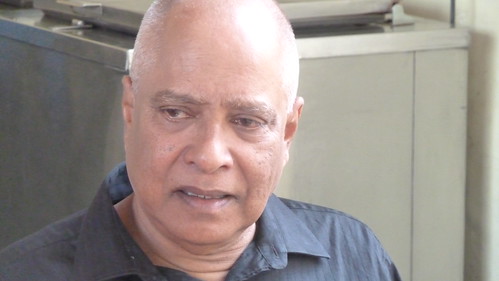Around two months ago, at the launch of
the Indo-Portuguese historian Teotonio de Souza’s latest book, Eduardo Faleiro,
former Union Cabinet minister and former NRI Commissioner of the Goa
government, argued for imparting primary education in the local language. Excerpts
of his speech were recently published in The
Goan Review (September-October, 2014), and therefore his key arguments are
available for greater scrutiny. Speaking at the launch of Goa Outgrowing Postcolonialism, Faleiro sought to trace a linear
and rather simplistic connection between the violence of colonialism, the
destruction of native culture, and the (purported) contemporary need for
education in the native language(s).
The core of Faleiro’s speech rested on
the understanding that Portuguese colonialism resulted in the destruction of
the Konkani language “almost completely”. Since “[l]anguage is central to
culture”, Faleiro seems to argue that one can undo the damage and alleged humiliation
of colonialism by regaining the pre-colonial glory of native culture. He therefore
suggests that Konkani and Marathi need to be studied at primary level and that
“[t]here is no justification for English as a medium of instruction at the
primary level”. Also, “Konkani should be taught in the Devnagri script as it
will provide access to Marathi and Hindi… [and] Children will learn the romi script
when they learn English”.
While acknowledging the ills of
colonialism, one should be careful not to take the idea of wholesale
destruction under colonialism at face value. Also, how valid is the idea that
the pre-colonial period was a glorious epoch and thus worthy of recovering? For
the problems with such thinking clearly come to the fore when Nagri script is
considered as a way out of the ills of colonialism. The underlying assumption
is that the Nagri script is more ‘Indian’ and hence best suited for the task of
recovering the lost cultural heritage.
Faleiro is not making any new
suggestions as far as the linguistic and cultural realms of Goa go. By making
the argument for the Nagri script, he joins a very long list of largely upper-caste
Nagri protagonists who have thus far ensured the denial of Government
recognition to the Roman script. One can understand why Faleiro is favouring
the Nagri script, as in the worldview that he seems to be drawing upon, the
culture-destroying Portuguese colonialism is where Konkani in the Roman script
had its birth. However, such an understanding fails to take note of the very
real possibility that through the Roman script, written texts (chiefly
Christian literature) were made available to a large mass of people. This access
was not possible prior to missionary intervention because until then it was
largely the brahmin pundits and other upper-caste groups who had sole control
over the production and access to knowledge. This is exactly the point that
Jason Keith Fernandes made in his talk The Secret History of Konkani, arguing also that one needs to view the Catholic
Church in Goa, through the intervention of missionaries, as a producer of a
language through the Roman script. Thus, according to this argument, the
Konkani language and knowledge was not destroyed completely but was made
available to a greater number of people.
The colonial legacy of the Roman script
itself is reason enough to reject it as a carrier of authentic Goan and Indian
culture. Such thinking can stray in dangerous directions. For, within this argument,
is the unsaid condemnation of Christianity and Islam, for the destruction of
natives and native culture in the process of proselytizing these religions. As
much of recent work by historians and anthropologists of Christianity and Islam
in the Indian subcontinent has demonstrated, conversion did not necessarily
result in a loss of native culture. Many historians have suggested that
conversion could also be a way out of caste. A perusal of these works would
convince many that the colonial past is a complex history and would need a
deeper understanding than what is allowed by our contemporary political setup.
The argument that English cannot be the
medium of instruction is again a bit suspect. Faleiro’s contention is that the “academic
performance” is not affected if education is imparted in local languages. However,
if one considers his understanding of colonialism and his espousal of the Nagri
script for Konkani, it becomes evident that Faleiro’s arguments have very
little to do with “academic performance”. Several Goan writers have stressed
that the parents should be given the right to decide for their wards. Recently,
a Supreme Court judgment too argued for upholding the choice of the parents in
keeping with the letter and spirit of the Constitution of India. The denial of
English as medium of instruction is also a denial of the legitimacy of the
aspiration of parents for their children. If thousands of parents/guardians feel
that access to English language would provide their wards with greater
opportunities in later life, then we need to consider their point of view much
more seriously, and not brush it aside the way Faleiro does.
We need to start recognizing that the
issues of the Roman script, medium of instruction, and Portuguese colonialism
are not isolated, but are intertwined with each other. This is the reason why,
one can suggest, Faleiro started his speech with a general reflection on the
destruction and mayhem of colonialism and ended with a suggestion for the
organization of “programmes to sensitise parents as to the need for their
children to learn in the mother tongue”. Rather than privileging the diversity
of Goan culture, only certain cultural traditions are privileged and recognized.
In a society that is struggling to maintain its plural and peaceful character,
such thinking will only add to our woes.
(First published in O Heraldo, dt: 1 October, 2014)
See also: 'Supreme Court, MoI, and 'Mother Tongue': Good News for Goa?', here.
'Medium of Instruction in Goan Schools: Mother Tongue or Multitlingualism?', here.
'Battle of the Konkanis: Separating Wolves from the Lambs', here.


No comments:
Post a Comment